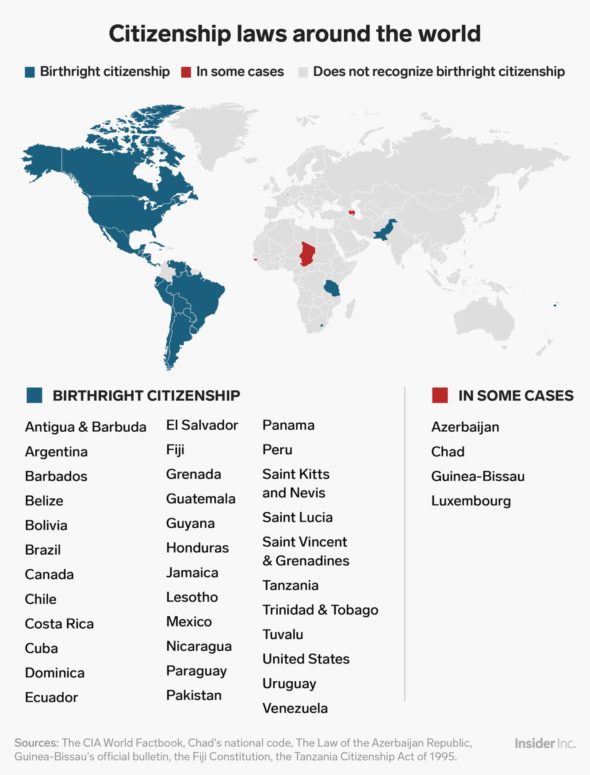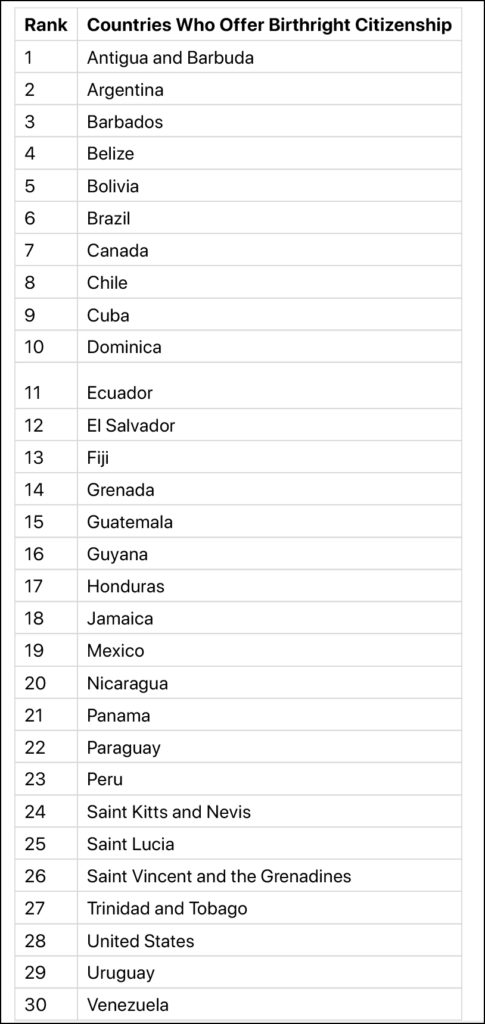
New parents pose with their baby at Richmond Hospital in a photo posted to Instagram by a birth tourism operator.
redo Jump to...
print Print...
(by Avis Favaro, Medical Correspondent, CTV National News) TORONTO — Canada’s reputation as a hotspot for birth tourism is rising fast, with new data reporting a 13 per cent increase in one year.
“It’s going up faster than immigration rates, faster than the overall population of Canada,” Andrew Griffith, a fellow at the Environics Institute and the Canadian Global Affairs Institute, said in a telephone interview with CTV News.
Birth tourism is the practice by which babies are born in Canada to non-residents (who are also not citizens) so they can receive automatic citizenship without having to [wait on line] through standard immigration processes. …
The 13 per cent increase was found in data Griffith collected from the Canadian Institute for Health Information (CIHI), which based it on information from hospitals across the country, excluding Quebec.
Their research shows a steady increase in births to non-residents from 2008 to 2017-18, and then a 13 per cent jump after that. According to CIHI, there were 1,354 non-resident births in 2010 and 4,099 in the 12-month period ending March 2019 – representing 1.4 per cent of all births in Canada during that time.
While some of the reported births involve international students and non-residents transferred to Canada for work, Griffith said he believes the majority of these cases involve mothers who travelled to Canada for the express purpose of giving birth.
“The laws were never intended for people to fly in and fly out,” he said.
Under Canadian law, children born in the country are automatically registered as citizens of Canada. [Neither parent is required to be a Canadian citizen.] This entitles them to Canadian post-secondary tuition rates, which are lower than what non-resident students pay, and allows them to sponsor their parents to come to Canada.
Brokers advertise Canada as one of the few developed countries in the world that offers unconditional citizen to babies of parents who are not citizens. Some “immigration” brokers explicitly note that children born in Canada will be able to enjoy benefits such as free education and other social programs, as well as travel to the country visa-free. …
Dr. Fiona Mattatall, a Calgary-based obstetrician and gynecologist, has noticed a [sharp increase of non-citizen births] in her province. CIHI reports …a 13 per cent increase over the previous year, and more than triple the number recorded in 2010. …
“Our system is not built to provide services (for) people (from) out of the country,” Dr. Mattatall said. “I’m worried as someone in the health-care system, we are already dealing with cutbacks. (Birth tourism) is causing strain in the system, and we are helpless to do anything about it.” …
“This is going to be an issue Canadians are going to have to discuss,” Mattatall said.
According to an Angus Reid survey taken in March, 64 per cent of surveyed Canadians say a child born to parents who are in Canada on tourism visas should not be granted Canadian citizenship. Sixty per cent say they want to see laws changed to discourage birth tourism. …
A wide-scale solution could be to end birthright citizenship entirely, as U.S. President Donald Trump has said he would like to do in the United States. …
Canadian Conservative Party members voted at a convention last year to make a ban on birthright citizenship to babies born to non-resident [and non-citizen] parents party policy, but the issue has not been raised since the election was called.
Published by ctvnews .ca on September 16, 2019. Reprinted here for educational purposes only. May not be reproduced on other websites without permission from Canadian TV News.
Questions
1. For CANADA, give the following information:
- capital
- location/the countries that share its borders
- the religious breakdown of the population
- the type of government
- the chief of state (and head of government if different) If monarch or dictator, since what date has he/she ruled? – include name of heir apparent for monarch
- the population
Find the answers at the CIA World FactBook website. For each country, answers can be found under the “Geography” “People” and “Government” headings.
NOTE: Before answering the following questions, read the info under “Background” and watch the videos under “Resources” below.
2. For CANADA:
a) list the who, what, where and when of the news item
b) What is “birth tourism”?
c) What rights do children born in Canada to parents who are neither residents nor citizens automatically receive under Canadian law?
d) How many countries permit birthright citizenship?
e) Check out the list and map of countries that permit birthright citizenship. The U.S. and Canada automatically grant citizenship to babies born in the country whose parents are not citizens. How do you think Canada should solve the problem of skyrocketing numbers of birthright tourism?
Background
What other countries have birthright citizenship?
Most countries in the world do not offer birthright citizenship — only 30 out of the world’s 194 nations automatically grant citizenship to children born to illegal immigrant parents, according to the Center for Immigration Studies (CIS).
No European country has birthright citizenship, and the global trend over the past 30 years has been to halt the practice. Notable countries that have ended birthright citizenship in recent decades include the U.K. in 1983, Australia in 1986, India in 1987, France in 1993 and Ireland in 2004.
The Western Hemisphere is a major exception — of the 30 countries that offer birthright citizenship, 29 are in North or South America. The U.S. and Canada are alone among developed nations worldwide that automatically grant citizenship to people born within their territorial jurisdiction.
Resources
Read “Where does the concept of birthright citizenship come from?”
Read “Chinese flock to USA to give birth to U.S. citizens” (from April 2015)
Watch a news report:
Daily “Answers” emails are provided for Daily News Articles, Tuesday’s World Events and Friday’s News Quiz.





